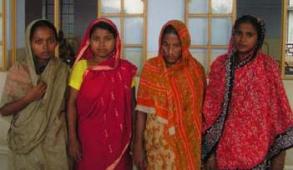This story was written in 2006, under the ACQUIRE Project.
Forty-four-year-old Reshmi, who lives in the vicinity of Kumudini Hospital, recently had fistula repair surgery and is now in recovery. Like many women in Bangladesh, Reshmi married when she was a teenager and became pregnant soon after.

Reshmi has three living children; her eldest is 18, and her youngest is 8. She has had both normal and difficult deliveries and has lost two babies. During her third delivery, Reshmi developed a fistula—she was delivering at home and went through a long labor. Unfortunately, the baby did not survive.
Reshmi, like many other women who have fistula, has been suffering from the condition for many years, not knowing about treatment or having access to it. But she heard about the availability of fistula repair surgery from a female welfare assistant, a community-based female health worker who goes door-to-door and provides basic family planning information and services.
The word is now spreading that treatment is possible, in most cases, through repair surgery. In early summer 2006, ACQUIRE conducted the first of a number of orientation sessions, informing government health officers and family planning workers about fistula treatment and prevention so they can incorporate such messages in their outreach. Since the opening of the fistula units at three private sector hospitals, ACQUIRE-trained community outreach workers have been referring an increased number of women for repair services to each of the sites. At the same time, ACQUIRE has been training providers in fistula repair, as well as in related clinical and counseling skills.
By supporting fistula repair services and at the same time increasing community awareness of fistula treatment and prevention, ACQUIRE hopes to ease the burdens of fistula faced.


